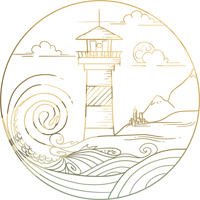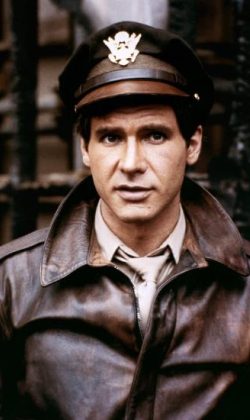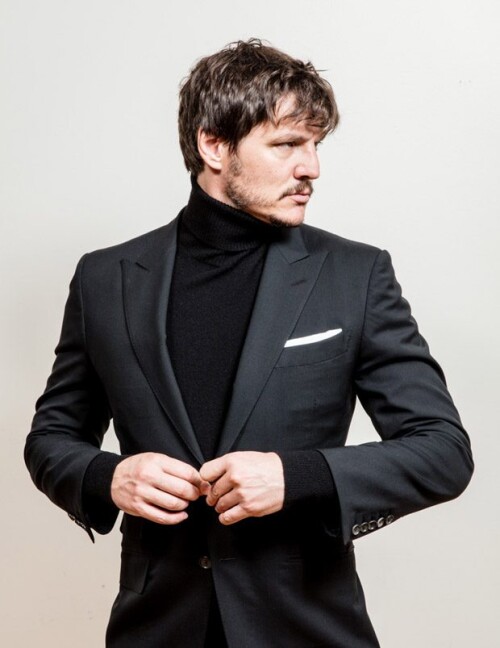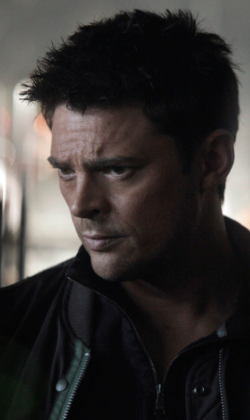Born into a wealthy family that called Manhattan's Fifth Avenue home, Dalton wanted for nothing during his childhood, except perhaps a normal family life. With busy parents, both in business and society, Dalton was more often than not handed over to the housekeeper, an immigrant from Ukraine who ran the house with a fist of steel. Olena suffered no fools or idiots, favouring discipline and order, but with a motherly warmth that made any disciplinarian action feel more loving than harsh. She made sure Dalton kept his feet firmly on the ground even if he'd been born with a silver spoon lodged so far down his throat it was a shock he didn't choke on it.
This was the status quo until his very early teens, when his mother was diagnosed with lung cancer and died soon after, despite all the money they threw at doctors and treatments. He was an angry child when he was grieving, taking it hard because while she had been a busy parent, she had never been neglectful. Always loving, even as she kissed both his cheeks on her way out of the door, rushing past in a cloud of expensive perfumes. She was a transient presence in his life, but one that shone so brilliantly her absence dimmed existence.
In the wake of this grief, his father had no patience for him, but Olena handled him with a firm but fair hand, now an all-encompassing presence in his life, never replacing his mother but taking on the role as best she could. She directed his frustrated tantrums in more productive directions, pulling books that spoke of ancient secrets off dusty shelves in the family library, whispered of her [i]baba[/i] who had mastered herbs and spices to soothe ills from what she made in her bubbling cauldron.
He read and read, etched circles and symbols. Small things, inconsequential things. Olena cautioned him in the same breath she encouraged him, the dangers that could get conjured if he became too ambitious. Slowly, light and life trickled back into his young life. Enthusiasm for what he was working on, an idea that defied all science, even as a warm glowing presence flickered out of the corner of his eye, leaning against the library fireplace and swirling a glass in her hand.
It took him months to realise the presence in the room. She visited infrequently, but her presence heralded a soothing warmth that defied the grief clenching around his childlike heart. A frenzy gripped his young mind as he dived further into the unknown, leveraged a father's guilt to pour money into finding rare tomes and forgotten scrolls. He was young enough that they indulged the behaviour, even if his grades could not slip under Olena's stern gaze.
His drive in the beginning had been to solve the question of death, cases such as his mother where her body tore her apart and left a hollow shell in a sterile hospital bed. Even as a child he was smart, learning at the benches of the most elite private schools money could buy, and it did not take long for him to realise the hopelessness of pursuing that question. Magic could only stave off death at the cost of something far more precious, and that was a price Dalton was unwilling to pay. A price they discouraged him from paying, the glowing presence of a mother long dead whispering in his ear that he should live, not obsess over death at such a young age.
Dalton did not quite give it up, but he pivoted in a different direction. A medical doctor. A surgeon. A biochemical researcher. These were fields that would sate that desire to rail against human frailties, but only held blissfully mundane risks. He had performed well enough throughout his schooling that even realising it in his late teens didn't put a damper on his ambitions.
So the young Cessair sought the path of medical school. Boston became his new home when he finished high school, forging his path to Harvard's pre-med programme and finally medical school. He set his sights on becoming a surgeon early on, practicing his magic on the side. The two disciplines were of two different worlds, but he shaped his magic to benefit him the most. Notebooks that would write the words he spoke, shining shapes of human organs and nerve clusters floating in the middle of his room as he studied them. How to rapidly transport himself from one point to another, unseen and unheard, to bypass his rivals and attempts at sabotage.
It was hard work, although with his wealth, Dalton could make his life conveniently spin around his studies. Away from the Fifth Avenue home he'd grown up in, his chosen apartment wasn't large, but placed in a better part of town. He hired in a private chef, but maintained the rest of his life as well he could. He was rich, but he was cautious about turning lazy, even if he leveraged his money in such a way to carve out conveniences that he could wrangle for himself. This was especially important during his residency, easing the stress of a hectic life.
After seven years of schooling and five residency years, Dalton found himself a fully fledged surgeon and thirty years old. In his private life, he'd amassed an expertise in magic that, while focused in on what worked for him, certainly made him an expert among the loosely organised social clubs that he'd frequented in New York. He kept aiming high, growing his reputation and getting work at Mount Sinai Hospital.
With his life settling, Dalton turned his obsession to his magical studies, spending his working shifts focused on his work, but the moment he was home he was back to delving into the intricate world of magical rituals. His father had left the Manhattan estate behind for warmer climes, leaving Dalton with a skeleton staff, Olena, and the infrequent presence that haunted his steps on certain days. He wasn't a social butterfly, but wasn't one for isolation, either. He socialised with coworkers, the magical social clubs, and mundane social clubs.
He published work, both mundane and (less officially) magical, although his contributions to his mundane field were modest at best. He was not some genius to stretch boundaries, although he supported those who carried the spark of inspiration as a sounding board and helpful hands. It was with magic that he found his chops for experimentation. He wasn’t always successful, but for every hole blasted in the floor or ceiling, or noxious smoke chasing him out of his workroom, he had a stream of successful experimentation that was both smaller applications of magic and grander ideas.
It was perhaps this success, the accolades from those he worked with in New York, that led him to his own Icarus moment. He was working on replicating knowledge, to see if it would be possible to share what someone knew, beam it straight into their brains, so to speak. First, this knowledge had to be taken from somewhere, and every mad magical scientist worth his salt experimented on [i]themselves[/i], didn't they?
He had thought to replicate his knowledge and then separate it from his mind, but that did not go according to plan. There are multiple components to knowledge: The pure theory, practical knowledge, and muscle memory. Perhaps the spell got too complicated for the way he'd built it, perhaps he had not given it enough energy to work with, perhaps it had been catastrophic bad luck, but Dalton was hit with a resonance effect so powerful it felt as if his very spiritual being was being torn asunder.
In reality, it was his entire stored knowledge being shorn in two, rather than his spirit. A mercy, considering what could've happened instead. It was Olena who rushed in while Dalton screamed himself hoarse and writhed on the floor, who dragged him away from the crumbling ritual. He spent days under the ill-effects, writhing in bed as his mind laboured under whatever had happened. Private doctors judged that he'd had some manner of stroke, throwing around words such as aphasia and apraxia.
As a week moved into a month, the aftershocks faded and the magic settled, and finally Dalton could take stock of what remained. He had the lion's share of his theoretical knowledge, and as he scribbled madly into diaries to figure out a pattern, he realised in this, only the magical theory seemed to have suffered significantly, although it wasn’t not entirely gone. More complicated theory hovered just out of reach, like he'd seen the page but hadn't taken in anything but the headline. Then, when he moved onto the practical things, his motor functions, he figured out why the doctors had thought apraxia. He could not complete the automatic tasks that had felt like second nature before the accident. The complicated practical and muscle memory process of identifying an action and then completing it physically in the right order was absent. Entirely gone or locked away.
Officially, Dalton retired because of a stroke, specifically a blend of ideomotor and ideational apraxia. Unofficially, Dalton had carved sections of his knowledge out of his brain through magic, removing the parts of his memory that had held these complicated actions and memories relating to his career and his magical development. There was no choice but to shift his focus away from the practical application of medicine and to something far less directly involved. He turned to teaching, but found many famous institutions were unwilling to take a risk on his degrees in light of the supposed stroke.
Being independently wealthy, the inheritor of his mother's estates and wealth, Dalton was not in trouble in the wake of losing his ability to work, as far as the mundane world was concerned. In addition to his father throwing money at him for treatments and therapies, he could have simply given up work altogether, but idleness was not in his blood, and Olena, older now but no less domineering, pushed him to sort himself out.
'Sorting himself out' took considerable time. He turned into a recluse, manic as he locked himself inside his home and worked on painstakingly relearning the important motor functions he'd lost. Hesitant hands relearned writing, drawing. He revisited the basics of theory, obsessively filling in the empty spots in his mind. His focus object, the central part of his early days of learning magic, had been destroyed during the accident, so this he had to reshape anew. He picked an amulet from his mother's jewellery collection, a unisex design that wouldn't catch too much attention. His care for himself slipped, setting aside fashionable clothing and good haircuts in favour of slinking around his home and repetitively performing tasks with hands that near shook with exhaustion. He paid for the treatments and therapies, knowing that would help him more than going it all alone.
It took a year for him to be satisfied with his progress. It took another six months to find work, most institutions wary of taking on someone with his supposed medical background. In the end, it was Baxendale College who accepted the risk of hiring him. Attached to their pre-med department and assigned to teaching general undergraduate courses, Dalton found a new lease on life in Easthaven. As he settles in to teaching, he's also reached out to the local Sewing Circle, knowing that the best work is done alongside like minded individuals.












